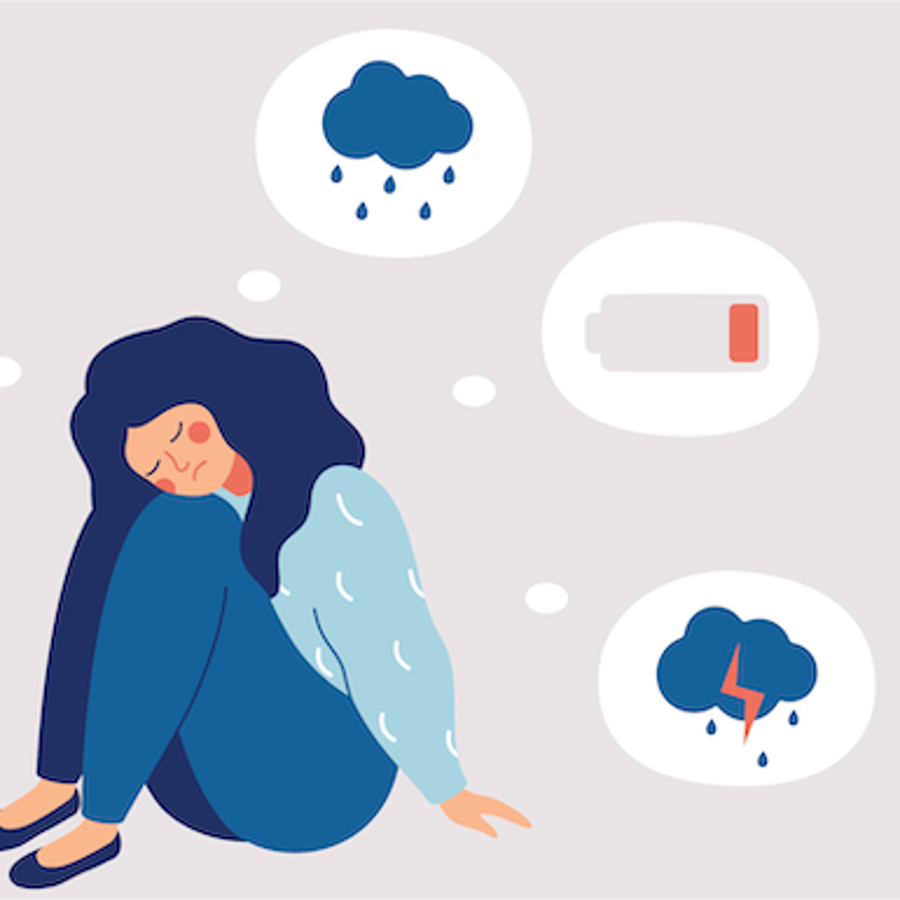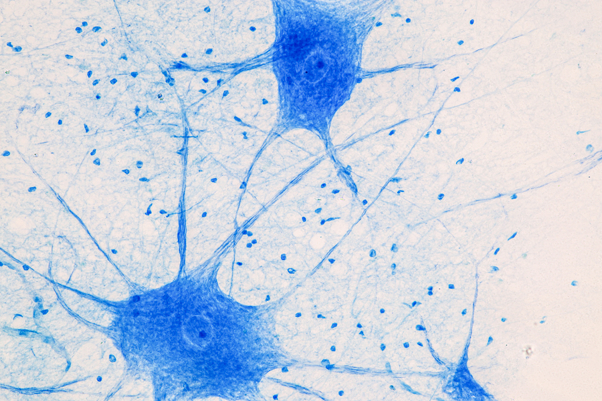
Is depression a genetic issue?
December 1, 2010

- Related Topics:
- Complex traits,
- Neurodiversity
A curious adult from California asks:
"Is depression a genetic issue?"
Great question! It would be so simple to just say depression is in our genes and leave it at that. However, this doesn't seem to be the case.
It looks like a combination of genes AND the environment leads to depression. Our genes make us more or less likely to have depression. But no matter what our genes are, usually something needs to trigger the depression.
Those triggers can come in lots of different forms. They can be the loss of a loved one, having a chronic or terminal illness, ending a relationship, stress at work and home, and the list can go on.
The importance of these types of triggers makes depression different from other disorders like bipolar disorder or schizophrenia. Environment still plays a part in both of these, but genes play an even larger role1.
Let's look at major depression. If a parent has depression, then their kids are three times more likely to have the mental disorder than those who do not have a parent with depression2.
So depression does seem to run in families. But it can be hard to separate the genes we inherit, the events in our life, and the behaviors we learn. This is where identical twins come in handy.
Twins and Depression
Is depression genetic or learned? Or both?
One way scientists figure out how much genes influence something is by looking at identical twins. These twins share 100% of their DNA.
Basically scientists look at how often both twins in a pair have whatever trait they are looking at. If something is totally due to genes, then both twins will always share that trait. Because they have the same DNA.

If sometimes only one twin has the trait, then the environment plays a role too. How often only one twin has the trait determines how big a role the environment plays.
We know eye color is almost completely genetic because identical twins have the same eye color 90% of the time3. The environment plays almost no role. This is different than depression.
If one identical twin in a pair has depression, the other twin also has depression around 40% of the time. This is true whether or not they were both raised in the same household4.
The fact that both twins develop depression at such a high rate tells us that genes play a role in depression. But since the other twin often avoids developing depression, we know that something else is involved too. That something else can include childhood experiences, illness, environment, learned behavior, and more.
Depression: a Learned Behavior?
There are many different types of depression. The most common ones we hear about in the news or in school are major depression and bipolar disorder. Here we'll focus on major depression, but you can also learn more about bipolar disorder here.
As we've talked about, genes are not the whole story with depression. Sometimes traumatic events can trigger depression, and family history also plays a big role.
Someone is more likely to develop depression when someone in his or her family has had depression. And this isn't just because of the genes these family members share.
Some scientists see depression as a "learned behavior." You can learn depression symptoms because people around you deal with life using those mechanisms.
Imagine a mom is diagnosed with depression. Her child sees this type of mental illness and so learns to cope with stress in the same way. The child is modeling the behavior of the mom5.
But not everyone with a depressed parent has depression. And not everyone who loses a loved one develops depression either. A big difference between these two groups of people is the genes they have.
Depression Gene: Truth or Myth?
Some researchers have claimed to have found a depression gene. But as more research gets done, it is becoming clear that lots of different genes can be involved. To understand why this is, we need to take a step back and talk about genes.
We inherit our genes from our parents. Our genes act like an instruction manual and determine many of our traits such as our eye and hair color, blood type, etc. They can even determine illnesses that we may develop early or later in life.
People end up with different traits not because they have different genes. No, they are different because they have different versions of the same genes.
So people with blue eyes don't have a blue eye gene. They have a blue version of an eye color gene that we all share. The same sort of thing also can happen with genes that affect our emotions.
We all share the same genes that affect our emotional state and how we react to situations. It is just that some people have versions of these genes that make them more likely to develop depression. A whole set of these genes deal with a neurotransmitter called serotonin.
Neurotransmitters are messages that are sent between brain cells called neurons. The more serotonin that a neuron gets, the happier a person will be. Anything that affects how much serotonin is delivered is going to affect a person's mood.
Scientists do know that people with depression have less serotonin. In fact, medicines like Prozac work by increasing people's serotonin levels1*.

And scientists know some genes that control our level of serotonin. But what they've had a hard time doing is pinning down what genes are different in people who are more likely to become depressed.
Most likely, lots of genes with many variations all work together to make someone more or less likely to be depressed. This makes it very tricky to pinpoint exactly which genes and which differences are involved. But scientists are making some progress.
It is thought that the tryptophan hydroxylase-2 (Tph2) gene is involved in regulating serotonin levels. Research has shown that a single DNA letter change in the Tph2 gene in mice can affect how much serotonin is made6.
Tph1 is another gene that was found in mice to have an effect on serotonin levels. However, it is not known whether a single variation or multiple variations in the Tph2 or Tph1 gene affects serotonin levels in humans7.
Scientists have also identified a gene that may be involved in bipolar disorder and major depression in humans. The gene, called PBRM1, makes a protein that controls what genes get turned on and off.
Around 60% of people who have bipolar disorder or major depression have an altered PBRM1 gene. This suggests that gene changes can put a person at risk for having a mental disorder8.
Although some genes have been found to be involved in depression, no single gene has been identified. It is likely that a combination of genes contribute to depression.
So, the take home message: no, depression is not all genetic. Many triggers have been found to cause depression. It is important to recognize your risk factors, be healthy (mind and body), and build positive relationships!
* Editor’s note (7/1/22): In the past 10 years, scientists have found many more genes associated with developing depression. However, we still know very little about how these genes interact with trauma triggers to cause depression. The serotonin pathway was commonly suggested in early studies, but most current research disagrees with a central/causative role of serotonin. Depression instead seems to arise due to changes in complex and not-always-obvious pathways.9

Author: Dr. Khameeka Kitt
When this answer was published in 2010, Khameeka was a post-doctoral fellow in the Department of Biology, studying initiation and stabilization of epithelial cellular adhesions in James Nelson's laboratory. Khameeka wrote this answer while participating in the Stanford at The Tech program.
 Skip Navigation
Skip Navigation
